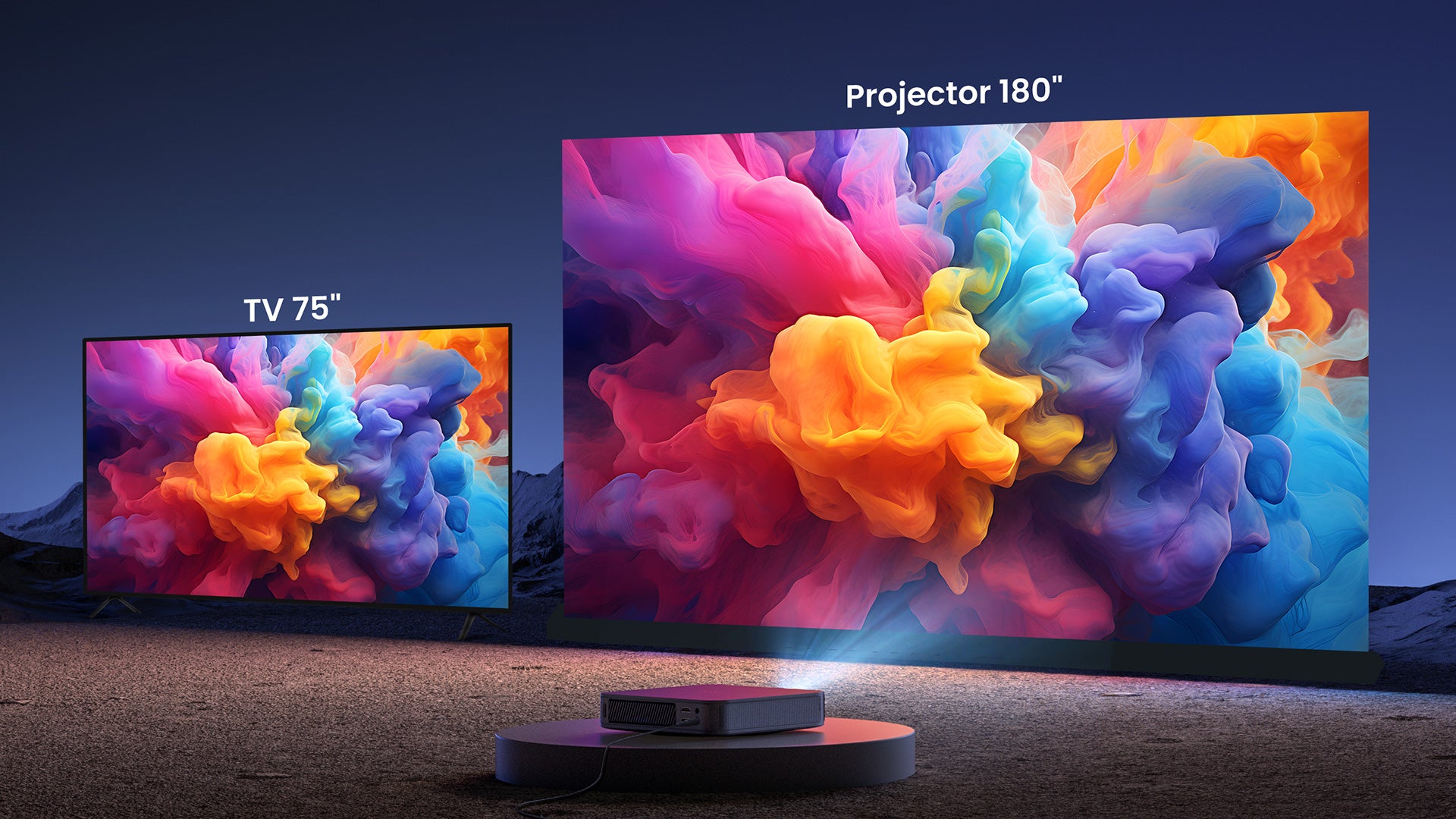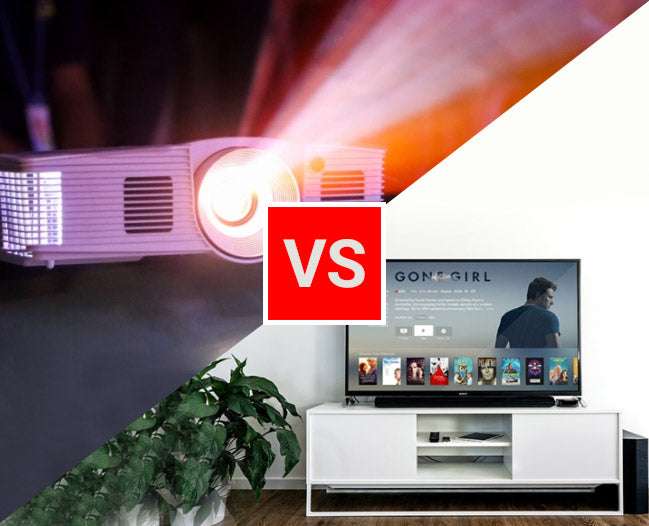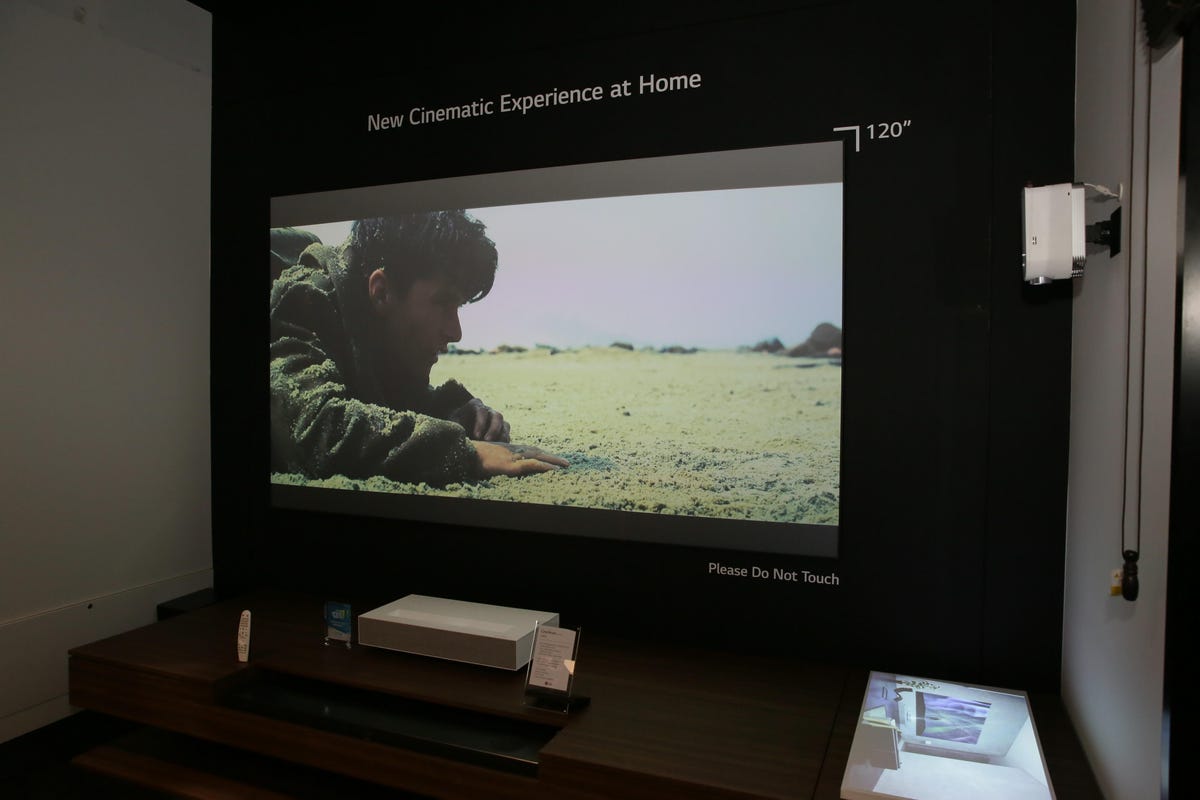Deciding between a TV or a projector can be challenging. Both have unique advantages and drawbacks.
In this blog post, we will explore the key differences between TVs and projectors. We will look at factors like image quality, cost, and convenience. Understanding these aspects will help you make an informed decision. Whether you love watching movies or need a solution for presentations, knowing the pros and cons of each option is crucial.
Let’s delve into the details and see which device suits your needs best. By the end, you’ll have a clearer idea of which is better for your viewing experience.

Credit: us.dangbei.com
Image Quality
Choosing between a TV and a projector for image quality depends on your needs. TVs often offer sharper, brighter pictures. Projectors provide larger display options, ideal for home theaters.
When it comes to choosing between a TV and a projector, image quality is a major factor to consider. You want the best possible viewing experience, whether you’re watching a movie, gaming, or streaming your favorite show. Let’s dive into the specifics and see how TVs and projectors stack up.Resolution And Clarity
Resolution is critical. TVs generally offer higher resolution options, like 4K or even 8K. This means sharper images and finer details. Projectors can also provide 4K resolution, but achieving that clarity often depends on the quality of the projector and the screen. Cheaper projectors may not offer the same sharpness. Clarity is another aspect. TVs usually have better clarity because they don’t rely on external factors like ambient light. A TV’s image remains crisp and clear in any lighting condition.Color Accuracy And Brightness
Color accuracy is crucial for a vivid viewing experience. TVs typically excel in this area. They provide consistent and vibrant colors thanks to advanced technologies like OLED and QLED. Projectors may struggle with color accuracy. The color can vary depending on the quality of the projector and the screen material. High-end projectors can match TV color performance, but they come at a higher cost. Brightness is another key factor. TVs are generally brighter, making them suitable for any room, regardless of lighting conditions. They can maintain their brightness even in well-lit rooms. Projectors rely heavily on ambient light control. In a dark room, they can perform well, but in a bright room, their image can appear washed out. You might need blackout curtains for optimal projector performance. Which do you think will work best for your setup? Do you prioritize a sharp, clear image or vibrant, accurate colors? Your choice might depend on where you plan to use it and what kind of experience you want.Screen Size And Viewing Experience
When deciding between a TV and a projector, screen size and viewing experience often play a crucial role. The way content looks and feels can significantly impact your enjoyment. Let’s dive deeper into how each option fares in this aspect.
Adjustability And Flexibility
One of the standout features of projectors is their adjustability. You can easily change the screen size by moving the projector closer or farther from the wall. This flexibility is perfect for various room sizes and viewing needs.
However, TV screens are fixed in size. If you want a bigger screen, you need to buy a new TV. This lack of adjustability can be a limitation if you have diverse viewing preferences.
Consider your space and how often you might want to change your screen size. A projector offers more flexibility, making it a versatile choice.
Immersiveness And Comfort
Projectors can create a truly immersive experience. The large screen can make you feel like you’re in a movie theater. This can be especially enjoyable for watching movies or playing video games.
But, the quality of the projector and the surface it’s projected on can affect the viewing experience. Ensure you have a good quality projector and a smooth, white surface for the best results.
TVs, on the other hand, usually offer better image quality and brightness. They are also more convenient for daytime viewing without worrying about room lighting. This can be a major plus for regular TV watching.
Think about your primary use. Do you want a theater-like experience, or do you prefer the convenience and reliability of a TV?
Ultimately, your choice between a TV and a projector for screen size and viewing experience depends on your needs and environment. Consider what’s more important to you: flexibility and immersion or convenience and image quality.
Installation And Setup
When deciding between a TV and a projector, consider the installation and setup. This aspect can greatly influence your choice. Installation ease and space requirements play vital roles in this decision.
Ease Of Installation
A TV is generally easier to install. You just need a stable surface or a wall mount. It’s straightforward and quick. Most people can handle it alone. The setup process is user-friendly.
On the other hand, a projector requires more steps. You need a proper mount or shelf. Then, adjust the projector to get a clear image. This can be tricky for some. You may need help. Also, you might need to install a screen or use a blank wall.
Space Requirements
TVs need less space. They fit well in most rooms. You can place them on stands or mount them on walls. This flexibility makes them popular in homes.
Projectors need more space. You need a larger room for the best experience. The distance between the projector and the screen matters. A bigger room allows for a larger image. Also, consider the space for the screen. It should be free of obstructions.

Credit: www.ooberpad.com
Cost And Value
Choosing between a TV and a projector often boils down to cost and value. While both options have their pros and cons, understanding the financial aspects can help make an informed decision. This section breaks down the initial purchase price and long-term costs of both TVs and projectors.
Initial Purchase Price
TVs generally have a lower initial purchase price. They come in various sizes and models to fit different budgets. Smaller TVs are especially affordable. Projectors, on the other hand, can be more expensive upfront. High-quality projectors often require an additional screen for optimal viewing.
While entry-level projectors are available, they may not offer the best quality. For a good viewing experience, investing in a mid to high-range projector is advisable. This can significantly increase the initial cost.
Long-term Costs And Maintenance
Long-term costs also play a role in the decision. TVs typically require less maintenance. They have a longer lifespan and fewer parts that can break. This means fewer costs down the road.
Projectors often need more maintenance. Bulbs, for example, need to be replaced periodically. These bulbs can be costly. Plus, projectors might need more frequent cleaning to keep the image quality high.
Electricity consumption is another factor. TVs are generally more energy-efficient than projectors. A projector may use more power, especially in a home theater setting. This can lead to higher electricity bills over time.
Portability And Versatility
TVs offer easy setup and are compact, making them ideal for small spaces. Projectors provide large screens and flexibility for diverse viewing experiences.
Portability and versatility are significant factors when deciding between a TV or a projector. These elements can greatly influence your choice, depending on your lifestyle and how you intend to use the device. Let’s explore how each option fares in terms of ease of moving and setting up, as well as their multiple uses and applications.Ease Of Moving And Setting Up
One of the primary advantages of projectors is their portability. You can easily carry a projector in a backpack, making it ideal for outdoor movie nights or presentations on the go. Setting it up can be as simple as placing it on a flat surface and pointing it at a blank wall or screen. Conversely, TVs are generally heavier and bulkier. Moving a TV often requires careful handling and sometimes an extra pair of hands. Once placed, however, setting up a TV is straightforward, usually involving just plugging it in and connecting to your devices.Multiple Uses And Applications
Projectors shine in their versatility. They can transform any space into a cinema, whether it’s your living room, backyard, or even a friend’s house. You can use them for gaming, presentations, or streaming your favorite shows on a large screen. TVs, while less portable, offer consistent performance in one spot. They are perfect for daily use, such as watching news, playing video games, or streaming shows. TVs also generally offer better sound quality without needing external speakers. When you think about your typical usage, do you find yourself needing a device that can easily move with you? Or do you prefer the stability and ready-to-go nature of a TV? Your answer can help you decide which option is better for your needs.
Credit: www.cnet.com
Sound Quality
Sound quality can be a game-changer when deciding between a TV and a projector. While the visual experience is crucial, the audio can significantly impact your overall enjoyment. Let’s dive into the sound capabilities of both TVs and projectors.
Built-in Speakers
Most modern TVs come with built-in speakers that deliver decent sound quality. These speakers can handle everyday viewing, from news broadcasts to your favorite sitcoms. However, if you’re someone who loves the cinematic experience, you might find the sound a bit lacking.
Projectors, on the other hand, often have built-in speakers too. The catch? They usually don’t match the quality of TV speakers. In many cases, projector speakers are an afterthought, offering only basic audio capabilities. This can be a deal-breaker if you’re expecting a rich, immersive sound.
External Audio Options
Both TVs and projectors offer the possibility of connecting external audio systems. TVs typically have multiple audio output options, such as HDMI ARC, optical out, and Bluetooth. This allows you to connect soundbars, home theater systems, or Bluetooth speakers with ease.
Projectors also support external audio connections, but the setup can be a bit more complex. Depending on the projector model, you might need additional cables or adapters to connect to your audio system. However, once set up, the sound quality can be just as good, if not better, than what you get with a TV.
So, which is better for sound quality? It really depends on your setup and preferences. If you’re planning to rely on built-in speakers, a TV might be your best bet. But if you’re willing to invest in an external audio system, both options can offer excellent sound quality.
What do you prioritize more in your viewing experience: convenient built-in sound or the potential for a high-quality external setup? Your answer might just tip the scales in favor of one over the other.
Frequently Asked Questions
Is Having A Projector Better Than Tv?
A projector offers a larger screen experience, ideal for home theaters. TVs provide better brightness and ease of use. Choose based on your needs.
What Are The Disadvantages Of Projector Over Tv?
Projectors often require a dark room for optimal viewing. They also have higher maintenance costs and shorter lamp life. Image quality may not match high-end TVs. Setup can be complex and they need more space. Sound quality is usually inferior, needing external speakers.
Can A Projector Replace Your Tv?
Yes, a projector can replace your TV. Projectors offer larger screens and a theater-like experience. Ensure suitable lighting and space for optimal performance.
What Lasts Longer, A Tv Or A Projector?
TVs generally last longer than projectors. A TV can last up to 10 years, while a projector lasts around 3-5 years.
Conclusion
Choosing between a TV and a projector depends on your needs. TVs offer convenience and ease of use. Projectors provide a larger screen and a theater-like experience. For small spaces, TVs work best. For movie nights or gaming, projectors shine.
Consider your room size, budget, and viewing habits. Both have their strengths. Make the choice that suits your lifestyle. Enjoy your entertainment, no matter what you pick.
